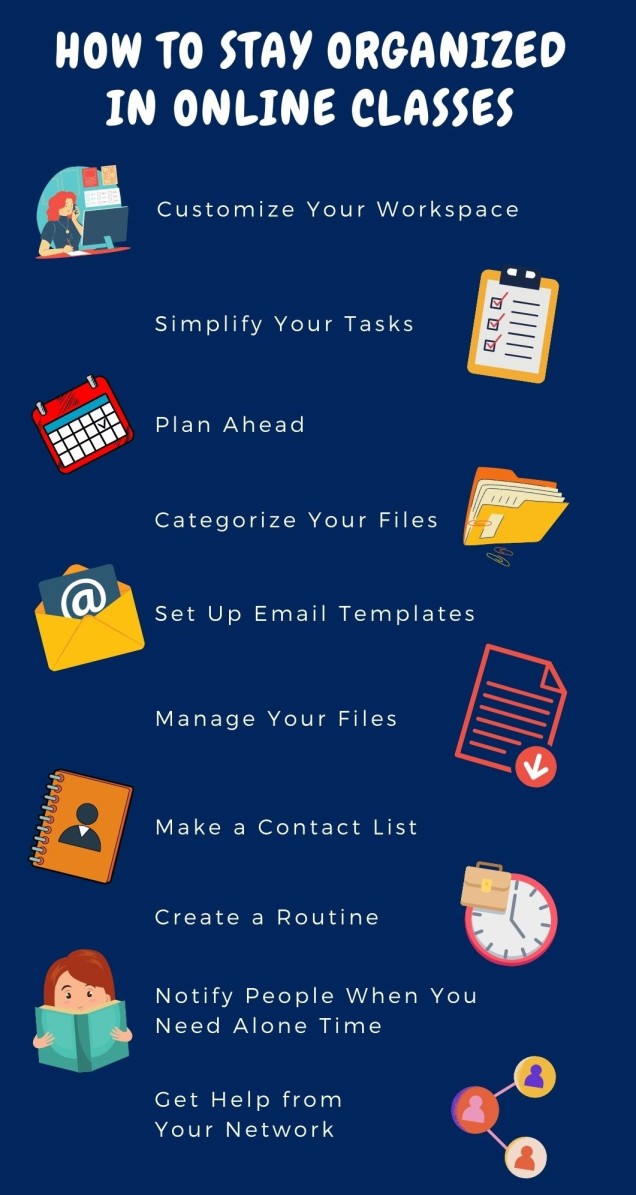How to Stay Organized in Online Classes
October 28th, 2021
Staying organized can be one of the challenges when taking online classes. Without an instructor physically present to guide you, you can easily get overwhelmed by the number of deadlines piling up in your calendar. Or, because nobody is monitoring your activities, you might easily get distracted by the temptations (Hint: social media) surrounding you.
Whatever your weakness is, it is easier to reel yourself back into your to-do list when you have a strategy. Read on to discover 10 tips on how to stay organized in online classes.
1. Adapt Your Workspace to Your Learning Style
Out of all the tips for online college classes, this tops the list. Embarking on a long and challenging endeavor such as distance learning will consume a great deal of your time. And to make such an undertaking doable, you would have to be comfortable doing it at the very least. Your location, regardless of where it is, becomes your “classroom”. Therefore, it should cater to your needs. Listening to your instructor, reading, writing, and creating projects require a quiet space. Participating in virtual classes necessitates a well-lit area that is free of background noise, so your teacher and classmates can hear and see you better.
While you can attend remote classes from the comfort of your own home, be very mindful of what other people can see in your background. Ensure that there is no trash, unorganized piles of clothing, or anything that could reflect badly on you. You might not have online class rules about this per se, but it would be best if you have a plain background (like a wall) or if you use a virtual background. Be prepared as well for possible internet connection issues or malfunctioning devices, which can hinder seamless communication in online classes.
You would also need enough space for your computer, notebook, books, and other school supplies. Because online learning requires an electronic device, you must be close to an electric socket to plug in your desktop or charge your laptop.
Devote your chosen space to studying only. The more you utilize it for that purpose, the more you would associate that area with studying and be inspired and focused to do so. If you already use it for other activities such as sleeping or eating, you might find yourself succumbing to those other activities instead of concentrating on studying.
If you fret about having a small space or not having a space at all for studying only, keep your study materials in a portable storage unit or bag that you can easily access or stow away when needed.
Arrange your desk, chair, and devices ergonomically to accommodate proper posture. Your monitor should stand at eye level and the middle part of your keyboard should align with the center of your body. In addition, the height of your chair should coincide with your desk’s height to allow your wrists to rest naturally on your desk. Opt for a chair with a backrest that allows you to sit up straight comfortably. A Frontiers in Public Health study published in April 2019 also recommends reducing sitting time and increasing physical activity to avoid back pain and injuries.
 Struggling with online classes? Heed these 10 tips on how to stay organized in online classes.
Struggling with online classes? Heed these 10 tips on how to stay organized in online classes.
2. Simplify Your Tasks with Digital Tools
Apple was not kidding when they said, “There’s an app for that.” In this digital age, numerous tools that can make your life easier abound. These can be accessed via different ways: you can go to a website, download a mobile phone app, install an application in your computer, or add a browser extension.
Expect to use several online systems when undertaking remote learning. Consequently, you would need an account for every online system, prompting you to create a username and password for each. PCMag suggests using free password managers such as Myki or LogMeOnce to avoid forgetting any of your passwords. After all, you do not want to go down that rabbit hole of trying to recall your password then just end up resetting it. Password managers also help you create different passwords. Experts recommend against using the same password for all of your accounts to avoid getting hacked easily.
If having several assignments overwhelm you, use a free homework tracker such as My Study Life, which you can also use even when you are offline.
“Most of the past two years has seen online learning acceleration borne of out necessity. However, this will become entrenched, which demands careful planning and organization on the part of the learner.” – Brian Naicker, Senior Director of Online Education at triOS College
Bookmark websites that you frequently visit, so you do not need to type their URLs every time or search for them in case you forget them.
If you need help on how to time-manage online classes, you’ll love the Marinara Timer. It is based on the Pomodoro method of productivity, where you work for 25 minutes then take a 5-minute break. It also offers an option to customize the timer, which you can take advantage of if you prefer a flexible schedule.
3. Plan Ahead
Benjamin Franklin, one of America’s Founding Fathers, once said, “If you fail to plan, you are planning to fail.” Knowing what to expect enables you to devise ways to efficiently complete a task or address a problem with minimal drawbacks to none.
Plot in the calendar your upcoming project deadlines, class presentations, and exams. If you prefer a paper calendar, place it where you can always see it. If you prefer to use a virtual one such as a phone app, use alert notifications to avoid missing a task.
4. Categorize Your Files Systematically
Folders will be your best friend — whether physical or digital. Your goal is to make each document easy to find when you need it. Label the folders and subfolders in a manner that you can easily differentiate them from one another eventually. Using the course title as a folder name can be a good start.
5. Set Up Email and Signature Templates
The online world requires a lot of email exchanges. When you do something repetitively, it helps if you already have a template that you can quickly customize and send easily. This holds true for messages that you anticipate sending out multiple times.
It may require you only a few minutes to send a short email, but those few minutes multiplied by several times would take up a huge chunk of your time in total.

6. Manage Your Downloaded Files
Virtual learning entails a lot of opening and downloading of files. (Sometimes, you’ll even end up downloading a file without intending to do so.) Saving files to your computer all the time might seem harmless because it is fast and effortless. However, doing so frequently will leave you with tons of files probably by the time you take your mid-terms. You might even need a moment to recognize a lot of them.
Make it a habit to clean up your download destination folder regularly by deleting files you will never use. Doing so will leave you with a smaller number of files, which will be easier to manage and will save you a lot of disk space. If you really need a huge number of your files and therefore must keep them, rename them at least for easy recognition and file them in corresponding folders for easy searching.
7. Make a Contact List
Make sure you have the name and contact information of important people in your school aside from your instructors. They may be department heads, guidance counselors, campus directors, internship coordinators, workshop/seminar coordinators, or financial aid advisors.
Get also the contact info of your classmates in case you need to follow up on a group project or simply need to clarify something.
Keep this contact list handy as you can never tell when it will become helpful.
8. Create a Routine
Establishing a habitual pattern makes it easier for you to recall your list of tasks, stay on course, and avoid wasting time to decide what you should prioritize.
As soon as you find out your class schedule, mark time blocks on your calendar for reviewing your notes, doing your assignments or projects, consulting your instructors, and studying for your exams. As your routine eventually becomes second nature to you, you will accomplish tasks faster and become more time-efficient.

9. Notify People When You Need Alone Time
Communicate in advance to the people around you when you cannot be disturbed. It may be a set schedule. For instance, they should refrain from talking to you from 6 to 9 p.m. It can also be an obvious signal such as a locked door or, if closing the door is not an option, something subtle such as wearing your headset.
10. Get Help from Your Network
Ask for support from people around you to make your student life easier. Request family members to help you with errands, so you can spend more time studying. Ask your boss if you can temporarily change your work schedule to accommodate meetings with your groupmates. You can also reach out to your friends to get some moral support during those stressful moments. Organize a study group with your classmates and assign each other a topic to create a reviewer on. The opportunities are endless.
Online learning soared when the pandemic started. While it may still be relatively new to some, it will remain as a “new normal” learning modality. Brian Naicker, Senior Director of Online Education at triOS College, said that online and flexible modes of learning will play a significant part in the future of learning. “Most of the past two years has seen online learning acceleration borne of out necessity. However, this will become entrenched, which demands careful planning and organization on the part of the learner,” he explained.
If you plan to study soon, knowing this learning trend can help you set expectations, organize your plans, and set yourself up for success.
Ready to take online classes? triOS College offers online diploma programs that you can complete in only 32 to 33 weeks. If you have questions on how online classes work, what your options are, or anything related to our online classes, please visit our Online Learning webpage.
